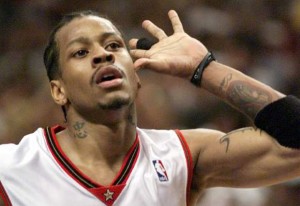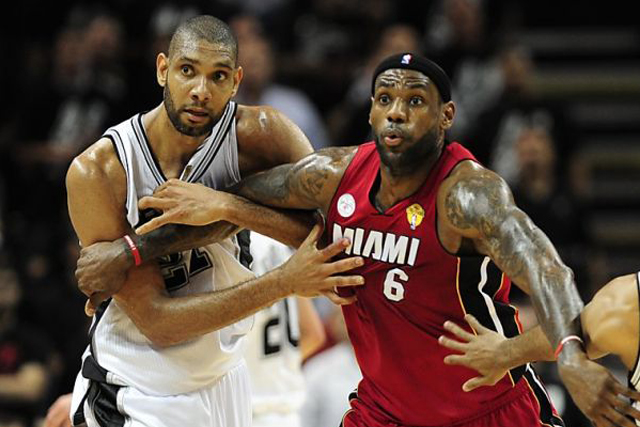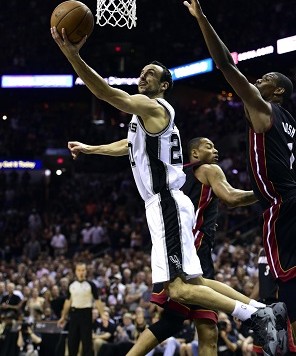With the NBA season over, the Crossover Chronicles staff will flock out like the heroes at the end of The Avengers to their own heroic deeds and adventures. Unlike Marvel, we will pull them together now and then to answer some big questions about the league.
Philip Rossman-Reich: What does the future hold for this Spurs team? After five titles in 15 years, where does this organization rank among the NBA’s best?
Matt Zemek: The Spurs now rate as one of the four best franchises in NBA history.
You could perhaps make the argument that the Philadelphia 76ers have left a bigger imprint on basketball, given their importance in the 1960s, late ’70s, and early 1980s, plus their brief run in the early 2000s.
You could perhaps say that the Fort Wayne-Detroit Pistons have carved out a significant presence in the NBA over an extended period of time. As is the case with the Sixers, an argument on the Pistons’ behalf would deserve to be heard.
Yet, did either of those franchises become a relentlessly annual force in professional basketball? Not quite.
 The Sixers’ highs in the ’60s were higher than the Pistons’ greatest achievements in that decade, but the past quarter of a century has been noticeably dry for the Sixers, save their brief run under Allen Iverson and Larry Brown.
The Sixers’ highs in the ’60s were higher than the Pistons’ greatest achievements in that decade, but the past quarter of a century has been noticeably dry for the Sixers, save their brief run under Allen Iverson and Larry Brown.
The Pistons did not win conference titles between the Bad Boy years and their 2004 championship run, but they were more regularly a factor in the Eastern Conference, and when Larry Brown (there is that man again) left, the team still reached the East Finals for a few more seasons. Only in the past half-decade have the Pistons ceased to be relevant. However, the Pistons did fall on hard times in the 1970s.
Know what organization did some pretty good things in the ’70s?
The San Antonio Spurs, following the NBA-ABA merger. George Gervin made the Spurs a presence, and interestingly enough, he led the team to the Eastern Conference Finals in 1979, losing to the Washington Bullets in seven games. Just stop for a minute and consider what the modern-day Spurs would have done if they had been slotted to the Eastern Conference. (They were switched to the West before the 1980-’81 season.)
With Artis Gilmore coming from the Chicago Bulls in 1982, the Spurs remained a factor in the NBA for much of the 1980s. With David Robinson’s arrival, the franchise continued to churn out playoff appearances. It was not until guys named Popovich and Duncan teamed up that the dynasty was launched.
At any rate, though, the Spurs have done enough in their entire history to enable these five championships to make them a top-four franchise in NBA history.
Josh Burton: Comparing teams from different eras is always difficult, especially when considering how much the NBA has changed since the early, dynastic days of the Boston Celtics, Los Angeles Lakers, and even the more recent Chicago Bulls with Michael Jordan.
Regardless, though, I think the Spurs with Tim Duncan, Manu Ginobili, and Tony Parker have to be put into that elite grouping of all-time teams because of how prolonged their success has been. From the end of the David Robinson days to the beginning of the Kawhi Leonard days (maybe, possibly I am getting ahead of myself), San Antonio has remained not only relevant, but dominant, winning five championships in that span.
 Overall, Michael Jordan won six titles in his career, all with the Bulls, and that “Jordan Bulls” team is usually referred to as one of, if not the best, single teams in NBA history. These Spurs are just one championship behind, and the way they crushed the two-time defending champs in the Heat, more titles could be in their future. That’s why there’s no reason the Spurs shouldn’t be — as Matt mentioned — one of the NBA’s top-four all-time franchises, and one could make the argument for them to be higher.
Overall, Michael Jordan won six titles in his career, all with the Bulls, and that “Jordan Bulls” team is usually referred to as one of, if not the best, single teams in NBA history. These Spurs are just one championship behind, and the way they crushed the two-time defending champs in the Heat, more titles could be in their future. That’s why there’s no reason the Spurs shouldn’t be — as Matt mentioned — one of the NBA’s top-four all-time franchises, and one could make the argument for them to be higher.
Philip: The NBA is so different now. I do not think any team will have the continued and sustained success of teams in the past like the Celtics in the 1960s or the Lakers in the 1980s. Even what the Bulls accomplished in the 1990s is tough to do that. They very well could have made eight straight Finals appearances — they still won six of the eight.
The salary cap has changed everything. The rules are getting more and more complex and so is the ability to stay at the top of the league.
It is the Spurs sustained success which makes them truly incredible and one of the greatest franchises of all time. They have managed the salary cap and the pitfalls of low draft picks for a decade and a half now. Through it all they have won 50 games (or the win percentage of 50 games) every year since 1998. Kawhi Leonard was the highest draft pick for the Spurs since Tim Duncan . . . and San Antonio had to trade George Hill to get him.
 It is so easy in this NBA reality to make a mistake and lose years because of it. San Antonio has never made those mistakes. They have been title contenders with few exceptions every year since Duncan was drafted in 1997. They switched superstars and offensive identities in the process and were still great.
It is so easy in this NBA reality to make a mistake and lose years because of it. San Antonio has never made those mistakes. They have been title contenders with few exceptions every year since Duncan was drafted in 1997. They switched superstars and offensive identities in the process and were still great.
Are the Spurs one of the great dynasties in NBA history? Until this year, they had never been to back-to-back Finals, much less won back-to-back championships. That will always be a knock on them as history looks back.
In the moment to those that experienced the Spurs, their longevity is simply unprecedented and unmatched. There will not be another group of selfless stars like this in an era where players have to strike while the money is hot in an age of controlled costs (something that becomes even more prevalent with the harder luxury tax and cap rules from the last round of collective bargaining). It will be tough to duplicate what the Spurs just accomplished.
Look at the Heat. Their championship run ended because they could not keep up with the salary cap. The search for cheap, effective players through free agency rather than the Draft may have ultimately claimed them. The Spurs keep replenishing through the Draft and smart, fiscally responsible free agent moves.
Everyone in the NBA is trying to emulate them. That appears to be their legacy. The greatest franchise of the modern salary cap era.

